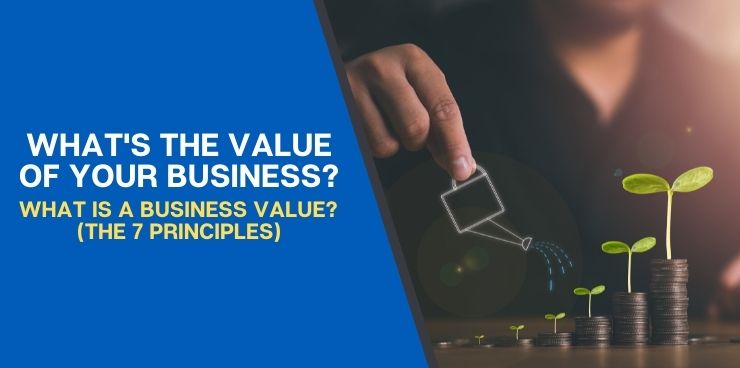People use many different metrics to determine how much a business is worth. Common factors are sales figures, stock prices or other measurable numbers. While these are good, these sorts of numbers only tell part of the story.
Value is more than just a business’s bottom line. In addition to looking at factors like revenue sales, there are other ways to look at a company’s overall worth. Many of those factors cannot be measured by simple economic value. This doesn’t make them any less important.
When you take everything about a company into account you get a better idea of a business’s overall worth. This is called business value.
What Exactly is Business Value?
Value is more than just a company’s bottom line or a total of all of its assets. Those are important metrics, true, but they don’t tell a company’s whole story. When you start looking at other factors, you get a better idea of what that business might truly be worth. Some of these factors include how the various stakeholders look at and feel about a company, how it’s valued by the community that surrounds it, the customer value determined by your clients and relationships.
The problem is, a lot of those intangible and unmeasurable ideas are difficult to pin down. There’s a lot of subjectivity that goes into determining the overall value of a business. To get a true idea of what a company might be worth you have to look at all aspects of it. You cannot only pay attention to those that you can easily write down on a piece of paper.
Whether you’re interested in selling your business outright, you want investors to help grow and expand or you’re just interested in knowing what a fair valuation of your business might be, it’s crucial to understand the concept of business value from the ground up.
7 Key Principles of Business Value
Several different ideas go into determining what is and isn’t considered a business value. Any business owner interested in creating and maintaining wealth needs to understand what goes into that determination. Here are seven principles of business valuation to understand:
 Value Changes Daily
Value Changes Daily
One of the most important points to understand about business value is that it’s not a number or idea that is set in stone. If you were to try and sell your business, you would stick a number on your business like a price tag, but business value doesn’t work like that.
It changes each and every day. As new decisions are made, and as the ramifications of past choices become clear, it affects your business value. As new employees are hired and seasoned employees retire or move on, it affects your business value. As competition waxes and wanes, as sales rise and fall, as assets become more or less reliable, it affects your business value. In short, your business value is in constant motion, and it is closely related to what is happening in the world around you.
Because it is impossible to know what your business value is from day to day, you might be tempted to overlook it as an unreliable distraction, but in fact the opposite is true. Because it can change, your business is always on the cusp of adding or losing value. A concerned and active owner interested in value management tries to stay on top of these changes as much as possible.
Value Is Determined By Your Future
When thinking of value, you might be tempted to spend a long time looking at and thinking about the past. You may linger on where you started from, how far you’ve come or how well you performed before. These are all vital for growing your business and turning it into what you have now. However, they are not so crucial when it comes to determining current business value.
To a large extent, business value is mostly concerned with what happens next. What good is it to be extremely successful last year if you can’t recreate that success again? Why does it matter how much you sold in the last quarter if this quarter is different?
Business value is less concerned with past economic profit and more influenced by what happens next. In other words, what does it look like your bottom line will be in the future? True, we spend time looking at past performance so we can get an idea of what will happen in the future. But, if you only think about past performance and stop looking ahead you will find your business suffering and losing value before you are aware of it.
Acceptable Rate of Return Is Determined by The Market
If you are looking to maximize on your business value and sell, then a lot goes into determining exactly when the best time to sell might be. You want to get the most value on exit. But, you also have to make sure your business is in a position to look attractive to potential buyers.
This is where the importance of future forecasting really comes into its own. If you want to sell, your business will only attract buyers who think that your company’s future is worth investing in. If future prospects look bleak, the chance of anyone being interested is pretty much nil. However, if you have a prosperous future on the horizon, a buyer can expect a much better rate of return.
Just what that acceptable rate of return is, however, changes depending on the type of buyers you are attracting as well as the general conditions of the market at any given time. Again, because these conditions are constantly changing, it can sometimes be hard to predict.
Net Tangible Assets Are Important In Determining Value
Measurable factors are important, and need to be nurtured. If you are looking to increase business value, then it only stands to reason that you would be interested in increasing all avenues of value, both the personal as well as financial.
Because of this, take the time to examine your tangible assets. These assets include measurable, physical things such as monetary assets, property, equipment, inventory and your accounts receivable. These items are considered especially important because they represent real cash that can be used for future investments, expansion or debt reduction.
A prospective buyer or investor looking to put hard-earned wealth in a company will have a difficult time securing financing in a business with only a few tangible assets. That’s because, should a problem arise, there’s very little that the business can do to raise funds and meet the crisis.
A company with a large amount of tangible assets is easier to get financing for, however. When a bank sees cash and equipment on hand, for example, there is value added because it feels like this is a much safer investment, because those assets are readily available should a situation arise where cash was needed quickly.
Value is Impacted by Transferability
Just as tangible assets are important, intangible factors are also taken into account when determining value. An example of how intangible factors can play a role comes with transferability.
“Transferability” in this case refers to the idea that some companies are incredibly dependent on their owners. A good majority of client relationships and goodwill are built around this person, and if the business were sold to a different party, those relationships might struggle in the new dynamic. When an owner is this hands-on that nothing can function right without him or her, then this becomes a problem.
So, to maximize your value, it actually becomes important for your business to be able to operate without you. This may seem counterintuitive at first, but makes sense when you think about it. No prospective buyer is going to want to step into a business where they are unable to take over the clients, sales and other operations.
 Liquidity Influences Value
Liquidity Influences Value
This probably seems obvious, but it is definitely a point that needs to be stated: the ability to sell your business quickly, and for a fair price, goes a long way towards determining the overall value of your business.
No investor is going to want to put in more time than needed for any prospective purchase. If there are multiple roadblocks affecting your business’s salability then it doesn’t matter what your bottom line looks like; your value will decrease due to those intangible, but very real, factors. To maximize that value you need to keep your business easily accessible and liquid.
Furthermore, that sale can only happen if you have the right buyers at the table, willing to negotiate and drive your company’s value. To do this, you might need to look at a controlled auction process or some other tactic that can help drive the buyers you need. Couple that with high liquidity and the chances of getting the right place for your business value go up a great deal.
Higher Premiums Are Paid for an Investor’s Ability to Control
Investors have no interest in putting money into a company where they have little to no say about what goes on. When people invest, they want to own a slice of the pie and also to dictate to an extent what happens to that pie in the future.
Of course, someone buying a majority stake in a company doesn’t have to worry about this so much. Power comes with majority ownership, after all. However, you might find it more difficult to sell to those who aren’t getting a majority share. In that case, they stand to sink a lot of money into your business, but not have a say in how that money is used.
While you may argue that this is just how business works, it does affect your business value, and more specifically how much someone might be willing to invest. Someone looking at a minority amount might not be willing to pay a premium fee for the opportunity. To combat this, many companies offer minority discounts, which allow investors to buy more shares at a slightly reduced rate. This helps to offset the frustration of lacking a controlling share.
On the other hand, a company might also implement a control premium, which is basically just an extra charge to someone buying a controlling share. They still have control, but have simply paid a little bit more for the privilege.
Conclusion
There’s a lot that goes into business valuation. The bottom line is important, but there’s so much more to it than that. If you are an owner looking to know more about your business value, or if you are a potential investor or buyer ready to find the right prospect, then it’s time you worked with the professionals. Contact us at Selling Revolution today.


 Value Changes Daily
Value Changes Daily
 Liquidity Influences Value
Liquidity Influences Value